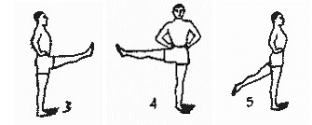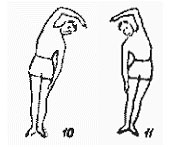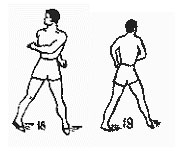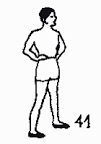Strengthening the muscular corset is necessary for every person, since this group of muscles ensures the correct position of the spine and maximum protection of the internal organs. It is important to understand that it is the deep muscles of the back, chest and abdomen that play the main role in such protection. Posture disorders and many diseases often occur against the background of a weakened muscle corset, which is why estet-portal.com decided to tell you which exercises are best for strengthening the muscle groups that form the muscle corset.
Self-examination before strengthening the muscular corset
Before proceeding directly to strengthening the muscular corset, it is better to check what condition it is in at the moment. Later, such a self-examination can be carried out to evaluate the effectiveness of the exercises.
Method 1
- Lie on your stomach, lift your arms and legs off the floor (at the same time!).
- By pulling your navel in, tighten your core, arch your back, and lift your chest.
In this position, you need to hold out for a minute. If you can't do this, it's time to seriously think about strengthening the muscle corset.
Method 2
- Stand on all fours so that your legs form right angles at the bends.
- Look ahead and stretch your neck as you extend your left arm and right leg (or vice versa) forward and backward respectively.
Purpose of checking – keep balance. If you didn't succeed, it's time to work on your stabilizer muscles.
Japanese gymnastics makko-ho: stop aging
Methods of strengthening the muscular corset: 5-minute Muller system
Many exercises are aimed at strengthening the muscular corset: fitness, Pilates, and barbells with dumbbells. However, there are excellent gymnastics that almost everyone likes and does not require going to the gym or special equipment.
The Muller system consists of 60 breaths performed simultaneously with ten exercises with the calculation of 1 exercise = 6 breaths. There are three degrees in the Muller system the complexity of the exercises, he recommends that everyone start with the exercises of the least degree of difficulty.
The first five of the exercises below are performed slowly 6 times, i.e. 1 exercise = 1 breath. The second five exercises are performed at an accelerated pace: maximum movements in 4 respiratory movements, 2 respiratory movements – relaxation. It is necessary to breathe during the exercises to strengthen the muscular corset through the chest and through the nose.
Isometric gymnastics - what is it and how to do it
Description of 10 Mueller exercises to strengthen the muscular corset
Since Muller recommends that everyone start training to strengthen the muscular corset precisely from the initial level of difficulty, and move on to complicating the exercises only after honing their skills, we decided to present exercises of the first degree for beginners to engage in the Muller system.
Exercise 1
IP: Hands on the belt. Feet close.
- Slowly raise the leg forward as high as possible, keeping your back straight and without bending your knees. Raise and lower the first leg while inhaling. Second – without pause on exhalation.
- This is followed by a slow rise of either leg to the side and lowering – all while inhaling, raise the other leg to the side and lower it while exhaling.
- Next, keeping your back straight, alternately raise one leg back and lower it (on inspiration), repeat the movement with the second leg (on exhalation).
Repeat the cycle twice.

Exercise 2
IP: Feet at short stride distance
- While inhaling, bend back as much as possible (with your head), move your hips forward and bend your elbows and hands clenched into fists.
- As you exhale, lean forward and down, straighten your arms and try to touch the floor with them. Do not bend your knees while doing this.

Exercise 3
SP: heels closed
- While inhaling, tilt your torso to the left (including your head), while moving your half-bent right arm (palm down) behind your head, exhale and return to the PI.
- Tilt to the right with your left arm bent.
- Don't lift your heels.

Exercise 4
PI: feet as far apart as possible, heels pointing outward
- Hands hang weakly on the sides, we turn the body, the right shoulder – back, left thigh – forward and vice versa.
- Turns should be done as far as possible without rotating the feet.

Exercise 5
IP: feet shoulder-width apart, arms at sides
- Hands (palms down) slowly raise forward while inhaling.
- We do a deep squat while exhaling.
- Let's straighten up.

Exercise 6
IP: feet are parallel to each other, almost closed
- Hands on the belt.
- While inhaling, we pull the sock and take the left leg back (do not bend the knees, do not bend over). Lowering the leg.
- On exhalation, we lift the other leg and, accordingly, lower it.

Exercise 7
IP: feet shoulder-width apart, hands on the belt
- Squeezing the hips forward, tilt the torso back (keep the neck straight).
- Squeezing the hips back and pushing the stomach forward, we tilt the torso forward, keeping the back and neck straight.
- Don't take breaks between forward and backward bends, breathe evenly.

Exercise 8
IP: hands are clenched into fists, heels are closed
- Tilt your torso to the right, pull your left arm bent at the elbow up, and lower your right arm down.
- Tilt your torso to the left and pull your right arm bent at the elbow up, and lower your left arm down.

Exercise 9
IP: feet wide apart, feet pointing inward
- Quickly rotate the upper body in the belt (the head does not turn with the body) to the right and then to the left, the lower body should be motionless. Two rotations for inhalation and two rotations for exhalation. The ultimate goal – for 4 breaths 40 rotations in both directions.
- When the right shoulder moves backward, the left hip moves forward and vice versa.

Exercise 10
SP: legs slightly apart and parallel, arms down
1. Raise the right leg bent at the knee, then the left. The toe of the foot should be lowered down, do not bend over.

2. Leaving the upper part of the leg motionless, we alternately raise the lower part of the left and right legs back and up. Heel strike on the buttock – sign of correct execution.

Perform core strengthening exercises, taking into account all of Muller's recommendations, to protect yourself from problems with internal organs and postural problems.






Add a comment